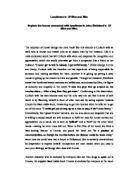Loneliness in Of Mice and Men
Explore the issues connected with loneliness in John Steinbeck's Of Mice and Men.
The reduction of human beings into mere 'tools' like this extends to Curley's wife as well, who is known and treated only as an object, even by her husband. Life in a male-dominated world has left Curley's wife alone and desperate for recognition and appreciation, which she would otherwise get from a companion like a friend or her husband: "I never get to talk to nobody. I get awful lonely." Unlike George, Lennie and Candy, Curley's wife has therefore not had experience of being responsible for someone and making sacrifices for them—whether it is giving up petting a dead mouse or giving up the chance to drink and gamble. Through her character, Steinbeck shows that loneliness breeds nastiness and selfishness, as indicated by Slim, the figure of authority and empathy in the novel: "I seen the guys that go around on the ranches alone ... After a long time they get mean." Conforming to this observation, Curley's wife has also become cold and the only way she can feel a sense of self-worth is by flaunting herself in front of other men and by acting superior towards Crooks the black stable-buck, threatening to get him lynched when he tells her to get out of his room: "I could get you strung up on a tree so easy, it ain't even funny.". Undoubtedly, like typical itinerant workers, she too is so alone and desperate that she is willing to accept casual sex with someone to fulfil her need for human contact and appreciation. As a result, she is seen as "jailbait" and a "tart" by the other ranch hands—making her even more left out. When in Part Five of the novel, she finds a keen-looking listener in Lennie, she pours her heart out "in a passion of communication, as though she hurried before her listener could be taken away" about how she could have had a future in Hollywood. She is certainly overwhelmed by desperation to express herself—companions are most needed when you need to vent your feelings, as George often does with Lennie.






